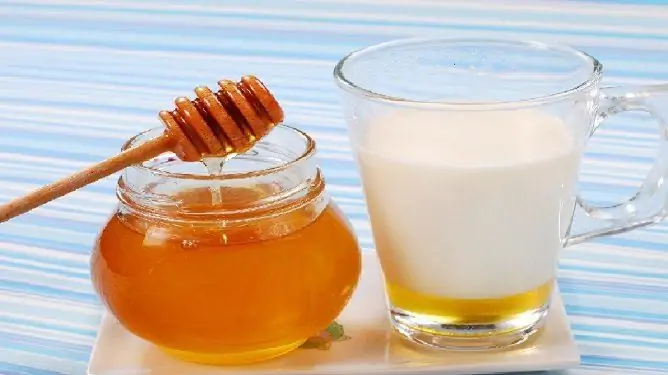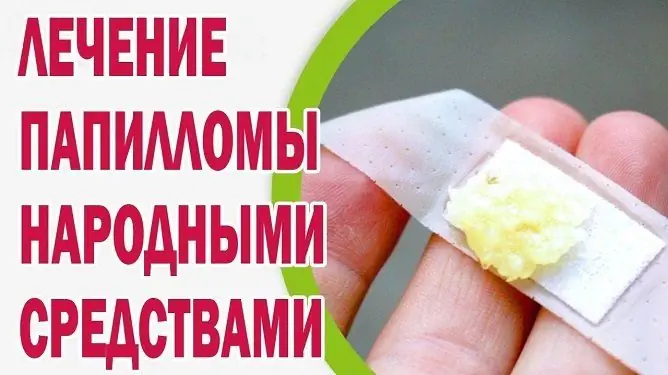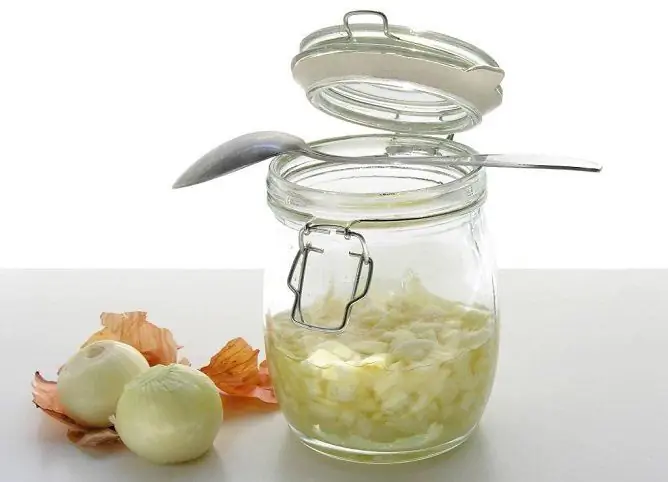- Author Rachel Wainwright wainwright@abchealthonline.com.
- Public 2023-12-15 07:39.
- Last modified 2025-11-02 20:14.
Treatment of dry cough with folk remedies
The content of the article:
- What to drink with a dry cough
- How to get rid of dry cough with inhalation?
- Compress recipes for dry cough
- How to treat a dry cough during pregnancy
- Types and causes of cough
- Video
Folk remedies for dry cough can be quite effective if taken correctly, they can speed up the patient's recovery by converting an unproductive cough into a productive one.
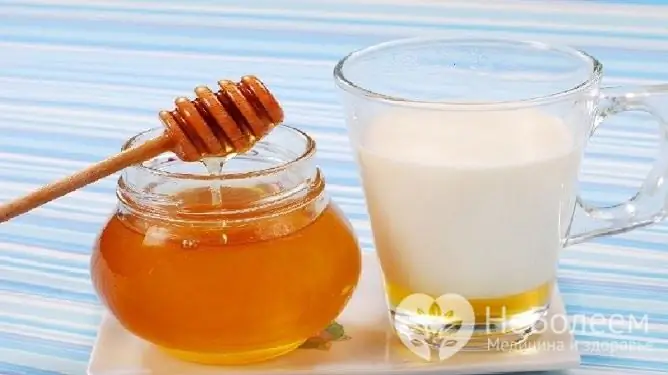
An effective remedy for dry cough - warmed milk with honey
A cough that does not separate phlegm is called dry, or unproductive. Usually it is paroxysmal in nature, worse at night. Often it is so strong that the patient has pain in the abdomen and chest. For the treatment of cough, various pharmaceutical preparations (tablets, syrups, potions) are usually used, as well as folk remedies for dry cough for adults and children. Let's talk about them in detail.
What to drink with a dry cough
The most common cause of dry cough is viral respiratory diseases, which are usually treated at home. In this case, folk remedies are often used:
- Milk with honey. Heat the milk to 60 ° C and add a couple of teaspoons of honey to it. Stir. This tasty and healthy drink should be taken 3-4 times a day in a glass (for children, the amount is reduced in accordance with age).
- Milk with figs. Pour 2-3 fig berries with a glass of milk. Bring to a boil over low heat and simmer covered for 10-15 minutes. Drink a glass warm 2 times a day.
- Decoction of medicinal herbs. Mix in one tablespoon of plantain leaves, crushed rose hips, chamomile flowers. Pour the resulting mixture with one liter of boiling water and simmer over very low heat for 10-12 minutes. Cool and strain. If desired, honey or sugar can be added to the broth to taste. Take half a glass every 2-3 hours.
- Soda milk. It helps very well to thin phlegm and convert a dry cough into a moist ordinary baking soda. Add a quarter teaspoon of baking soda to a glass of warm milk and stir. Take a glass 2 times a day. Instead of soda, you can use any alkaline mineral water, such as Borjomi. In this case, the recipe is somewhat different: 1/3 cup of mineral water is poured into 2/3 cup of boiling milk. This drink should also be drunk warm twice a day.
- Linden blossom decoction. Pour one tablespoon of linden flowers with a glass of water. Bring to a boil and then let it brew for 15-20 minutes. Strain and take 1-2 sips every hour. A decoction of linden blossom will help to cope not only with dry cough, but also will reduce the fever, reduce the severity of headache and muscle pain.
How to get rid of dry cough with inhalation?
The administration of drugs based on the inhalation of vapor, gas or smoke is called inhalation. This method is widely used in the treatment of diseases of the respiratory system, as it ensures the ingress of active components directly into the pathological focus. With a dry cough, inhalations eliminate irritation of the mucous membranes, contribute to the liquefaction of mucus, which improves its excretion. As practice shows, if you start to carry out inhalations from the first hours of the disease, then you can cure a dry cough in several procedures. Traditional medicine offers the following recipes:
- Soda inhalation. They reduce the viscosity of the phlegm. To carry out them, it is necessary to mix hot boiled and alkaline mineral water in a 1 to 1 ratio. You can also prepare a baking soda solution. To do this, dissolve 0.5 teaspoon of soda in a glass of hot water.
- Inhalation with essential oils. Essential oils (eucalyptus, coniferous) also help against dry cough. Add 5 drops of oil per liter of hot water.
- Inhalation with potatoes. Boil 2-3 medium potatoes in a liter of water until tender. Add 2 crushed garlic cloves to the water just before the procedure.

Inhalation is very effective for dry cough, especially if it is started at the beginning of the disease
Before inhalation, the solution should be cooled to 50-60 ° C in order to exclude the likelihood of burns to the mucous membranes and skin of the face. Sensitive skin can be protected from heat by applying a layer of oily nourishing cream. The person leans over a container of hot solution and inhales the vapors through an open mouth. The duration of inhalation is 5 to 15 minutes. You can repeat it 2-3 times a day. Hot steam inhalation refers to folk remedies for dry cough for adults, they are not recommended for children (in children's practice, the so-called cold inhalation with a nebulizer is preferred).
Compress recipes for dry cough
Folk remedies for the treatment of dry cough include a variety of compresses applied to the chest. The most popular are the following:
- Honey and vinegar. Combine a tablespoon of honey and vinegar in a cup, add three tablespoons of water to this mixture. While stirring, heat in a water bath to 50 ° C. Dampen a clean cotton cloth with honey-vinegar solution and lay on your back. Cover it with wax paper or plastic wrap. Cover the patient with a warm blanket. The compress should be kept for 20-25 minutes. It is most effective in the early days of the onset of cough.
- Potato compress. Boil 3-4 large potatoes and mash them in mashed potatoes. Add 2-3 tablespoons of vegetable oil and the same amount of ethyl alcohol with a strength of 70 °. To stir thoroughly. Form two thin cakes from the resulting puree, one of which should be placed on the chest in the back, and the other in front. Cover the cakes with plastic wrap on top and fix with a piece of gauze. The duration of the procedure is 40-60 minutes.
- Honey dough. Take 4-5 tablespoons of flour (preferably rye), honey and water. Mix the ingredients thoroughly and apply the mixture to the front of the chest, bypassing the heart area. Cover with wax paper and secure with a warm scarf or handkerchief. Such a compress can be kept all night long (at least 1-2 hours).
How to treat a dry cough during pregnancy
During pregnancy, any medication should be taken with great care and strictly as directed by your doctor. This principle should be especially carefully followed in the first trimester, when the organs of the fetus are laid. During this period, any negative impact on the body of a pregnant woman can cause serious disturbances in the embryogenesis process, which is why traditional medicine dry cough remedies are often recommended by doctors for pregnant women.
Inhalation of vapors of potato broth, alkaline mineral water or decoction of medicinal herbs (sage, chamomile, St. John's wort or linden blossom) helps to quickly alleviate the condition of a woman with a hasty dry cough. Inhalation can be carried out using the old "grandmother's" method - breathing steam over a pot of hot liquid, or with a nebulizer or a special inhaler.
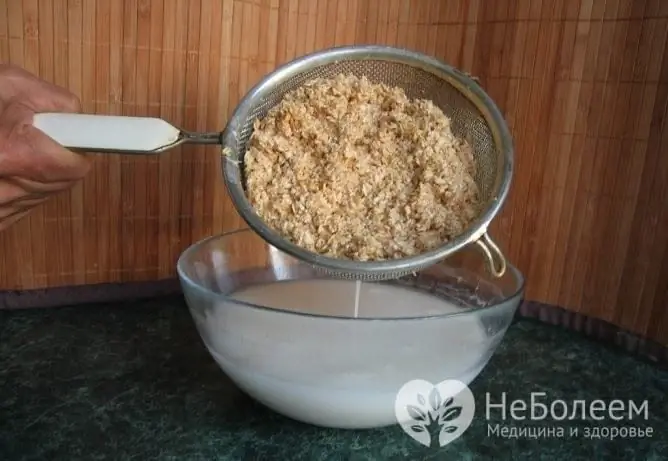
Bran broth is an effective and safe remedy for dry cough, it can be used by pregnant women
Any oral remedy for dry cough during pregnancy should also only be used with the permission of your doctor. The fact is that medicinal herbs contain biologically active substances that affect the body of the expectant mother in different ways. For example, thermopsis herb can increase the tone of the uterus, which, in turn, can cause premature termination of pregnancy. At the same time, there are safe recipes:
- Bran broth. Pour a pound of wheat bran with three liters of cold water. Bring to a boil and simmer for 10 minutes. Cool and drain. Add burnt sugar or honey to the broth to taste. The entire resulting portion of the broth should be drunk in small portions warm throughout the day.
- Poppy milk. Grind one teaspoon of confectionery poppy in a mortar into a fine powder and add it to 50 ml of warm milk. This milk should be drunk with severe attacks of dry cough 1-2 times a day.
- Infusion of meadow clover. Rinse the teapot with boiling water and put 2 tablespoons of meadow clover flowers in it. Pour a glass of boiling water over and leave for 15 minutes. Drink warm 4 times a day for half a glass of infusion.
Types and causes of cough
The causes of a cough, in which there is no expectoration of sputum, are:
- pharyngitis;
- laryngitis;
- tracheitis;
- inhalation of polluted air.
Thus, a dry cough is characteristic of damage to the upper respiratory system. If there is an inflammatory process localized in the lower parts (bronchitis, pneumonia), then the cough is accompanied by sputum separation. However, sometimes it is so thick and viscous, especially in the first hours and days after the onset of the disease, that it practically does not cough up. Therefore, it is often said that with bronchitis or pneumonia, the cough is first dry and then becomes wet, although in fact it is wet from the beginning.
The pathological mechanism of dry and wet cough is different. So, irritation of the nerve endings located in the mucous membrane of the respiratory tract leads to an attack of dry cough. From them, along the nerve fibers, the impulse is transmitted to the cough center of the brain, from where the "command" is given to make a cough push. Thus, an effective folk remedy for dry cough should act on the mucous membrane of the respiratory tract, eliminate its irritation, and relieve inflammation. Sometimes, to stop a dry cough attack, it is enough to simply soften the throat by drinking hot milk with honey and butter.

Children should not use either pharmacy or folk remedies for cough without consulting a doctor
Inflammation of the bronchi and bronchioles is accompanied by an increase in the secretory activity of the cells of their mucous membrane, as well as a violation of the movement of the cilia of the ciliated epithelium. This leads to the formation of phlegm, which envelops the pathogenic microflora, which is the cause of the disease, and, when coughing up, takes it out. In no case should a wet cough be suppressed, since stagnation of sputum in the bronchial tree threatens the development of complications. If the patient does not cough up sputum, then he needs to use the methods of traditional medicine, which allow a quick dry cough to turn into a wet one.
A dry cough can be a sign of whooping cough. This disease in about 50% of cases affects children under the age of 2 years and their course is quite severe. Epidemic outbreaks in each specific area are observed every 2-3 years. Complications of whooping cough are:
- bronchopneumonia;
- otitis media;
- spontaneous pneumothorax;
- emphysema of the subcutaneous tissue and mediastinum;
- epileptiform seizures;
- temporary paresis of the cranial nerves;
- spastic central paralysis;
- meningism syndrome;
- death (almost never observed in children over the age of 5 years).
Another cause of dry cough in children is croup syndrome. It usually develops at night and is manifested by the following symptoms:
- croupy (barking) cough;
- whistling sound on inhalation (stridor breathing);
- dyspnea.
This condition can also lead, with untimely and inadequate therapy, to the development of serious complications, such as pneumonia, asphyxia. Croup usually occurs in children in the first years of life and after the child reaches the age of 4 years and older, it is much less common.
Given the high risk of complications, the treatment of dry cough in children with folk remedies or medications should be carried out only after consulting a doctor and according to his appointment!
Heart failure can be another cause of dry cough in adults and children. In this case, treatment should be prescribed by a cardiologist and carried out not with folk, but with pharmaceuticals.
Video
We offer for viewing a video on the topic of the article.

Elena Minkina Doctor anesthesiologist-resuscitator About the author
Education: graduated from the Tashkent State Medical Institute, specializing in general medicine in 1991. Repeatedly passed refresher courses.
Work experience: anesthesiologist-resuscitator of the city maternity complex, resuscitator of the hemodialysis department.
Found a mistake in the text? Select it and press Ctrl + Enter.

